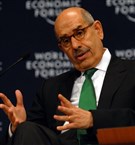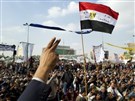Saeed sits in front of his butcher shop in the Cairo district of Manial, a few feet away from a polling station where only a few citizens cast their vote in the runoff of the first post-Mubarak presidential election. Saeed says he has lost faith in both the political elite and the state. He won’t be voting.
“Corruption is back. Neither of the candidates deserves my vote. We should save our effort for a second revolution,” he says, before taking a drag of his cigarette.
Enthusiasm for the electoral process has dwindled throughout the last year and a half of a confusing transitional period, throughout which many Egyptians have grown disenchanted with the official path.
Many of those who decided not to vote in the runoff say that recent court rulings, including the dissolution of Parliament on Thursday, have raised suspicions about the judiciary and the general integrity of the electoral process.
A recent court acquittal of senior Ministry of Interior officials who were accused of killing protesters is also seen as failure of justice.
Days before the elections, the Ministry of Justice issued a decision giving the military the right to arrest civilians, a move seen by many as an activation of martial law. On Thursday, a court deemed the political isolation law unconstitutional. The law would have excluded Ahmed Shafiq, Mubarak’s last Prime Minister, from the presidential race.
Turnout was low during the first round of the election, when only a bit more than forty-five percent of eligible voters went to the polls. But this round, it seems even lower.
“A bunch of pimps emerged after the revolution and stole it, whether it be the military council, those who speak in the name of the revolution, and lately the Justice Ministry,” says Saeed.
As a result of turn of political events in the past months, Mohamed Bayoumi, a kiosk owner, came to feel that his vote is worthless and that the decisions are still made by the same regime that used to rig elections for Hosni Mubarak and his National Democratic Party.
“Why would I vote? I voted for the Parliament, then they dissolved it," he says."There are mechanisms moving everything and we’re just marionettes. If all of the eighty million Egyptians vote for [Muslim Brotherhood candidate Mohamed] Morsy, Shafiq will still win. It’s been determined since the day that Mubarak stepped down."
Some who are not necessarily against the electoral process itself say they are not satisfied by either of the candidates.
The choice in the runoff came down to Shafiq, who is largely considered a part of the regime that the revolution erupted to overthrow, and Morsy, the candidate of the Muslim Brotherhood which disappointed many of its supporters with its performance in the interim parliament, now dissolved.
“Morsy doesn’t have the personality of a president and Shafiq is from the old regime," says Hamdy Mahdy, who sells poultry. "We can’t have a revolution to remove the old regime and then bring it back. We’ll be the laughing stock of the world. I am disappointed with the elections. People don’t know what’s right anymore.”
After former socialist candidate Hamdeen Sabbahi lost in the first round, many have been left without a candidate to support. Khaled Hilal, a retired government employee, says he doesn’t believe either of the remaining candidates care for the country`s poor as Sabbahi did.
“Neither of them is good enough, what would I go for? The most important thing for me is for the winner to raise pensions and treat us well. I don’t see that in either of them,” says Hilal.
Activists and groups who reject both candidates have tried to organize those who refuse to vote in the runoffs in order to transform their frustration into an actual political punch.
Two different campaigns have been working to that end. One calls for boycotting, in order to deprive the whole process of legitimacy. The boycott has gained more supporters in the second round. Another campaign calls for voters to invalidate their ballots.
The two campaigns maintain that, forced to choose between the military state and the religious state, they will choose neither and continue on the revolutionary path.
Ahmed Salama, a cofounder of the campaign to invalidate votes, says that without a constitution, even the candidates themselves don’t know what powers they have. As a result, he says their promises can’t be trusted.
Invalidating the votes instead of boycotting altogether gives the group of three thousand activists more legitimacy, organizers say. Invalidated ballots are tallied in the vote count, so the opposition group will have clear numbers.
“This is to demonstrate proactivity,” says Salama. "We want to say that we haven’t been negative, we went and stood in line with you and took part in the democratic mechanism to say that we reject both candidates."
Boycotters also demonstrated in Tahrir Square on Saturday to voice their rejection of the electoral process.
[This article originally appeared in Egypt Independent.]
![[An Egyptian polling station for the past presidential elections. Image originally posted to Flickr by Zeinab Mohamed.]](https://kms.jadaliyya.com/Images/357x383xo/7257515168_388a3522a9.jpg)





